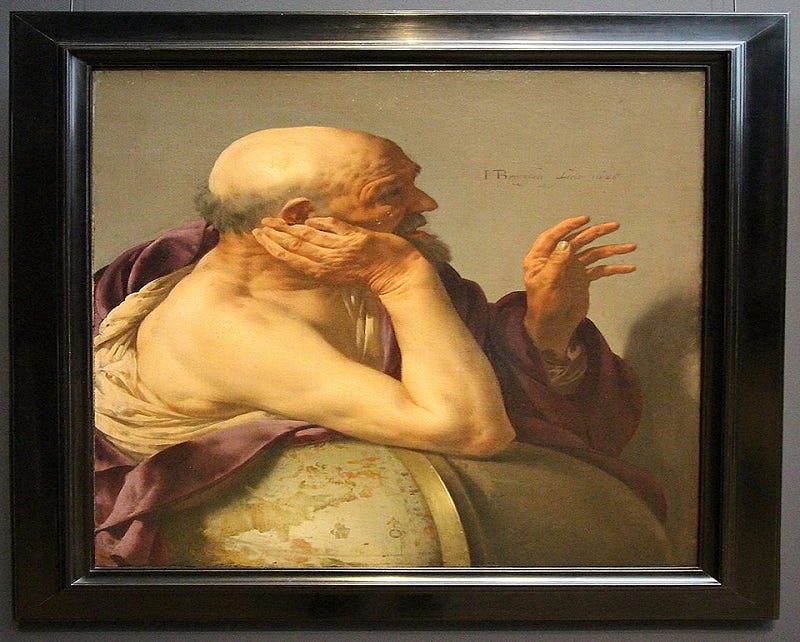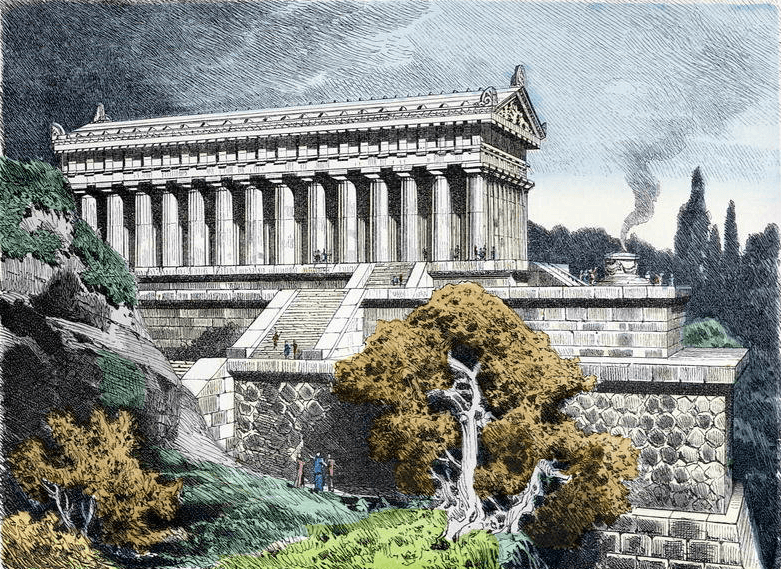The Grumpy Philosopher Who Shaped Christianity and Stoicism
Written on
Chapter 1: The Philosophical Divide
In the realm of philosophy, a significant distinction exists, particularly when examining its evolution in the Western tradition. This narrative often splits into two eras: the time preceding Socrates and the period that follows. This division is akin to the designations of BC and AD, but instead, we emphasize a notable "S" for Socrates.
People frequently assert that this divide exists because Socrates was such a pivotal and transformative figure in philosophical discourse. However, this perspective can inadvertently suggest that earlier philosophers were of lesser importance, implying that philosophy truly began with Socrates.
What if I revealed that a philosopher who predated Socrates had his works preserved in one of the ancient world’s wonders? The Temple of Artemis, with its vastness, could have held the monumental ideas of this thinker. His insights laid the groundwork for Stoicism and Christianity, and resonate with the thoughts of modern figures like Darwin, Nietzsche, and William James. This philosopher intentionally crafted his writings with ambiguity, akin to the ancient Chinese thinker Zhuangzi, encouraging readers to contemplate rather than simply echo the teachings of a select enlightened few.
Adding to his distinctiveness, he became known as a misanthrope, eventually retreating from the close-knit Greek society to live a solitary life, akin to that of a hermit. He criticized every so-called "wise" philosopher of his era.
Imagine a cantankerous elder, admonishing children to vacate his yard, while simultaneously contemplating the fundamental nature of the universe, leaving behind wisdom for them to discover as they matured. In time, these once-young individuals would come to realize the validity of the grouchy philosopher's insights, recognizing the profound wisdom embedded in his seemingly irritable proclamations.
This philosopher is none other than Heraclitus of Ephesus. To fully grasp the significance of his ideas, we need to explore his four foundational principles: Fire as the First Cause, the Eternal Nature of Change, the Unity of Opposites, and a Reason for the Whole.
Section 1.1: Fire as the First Cause
Joshua Mark from the World History Encyclopedia notes that early philosophers sought to identify the First Cause of the cosmos. While some attributed this to elements like water or air, Heraclitus boldly chose fire. Fire, he argued, embodies both creation and destruction.
Historian Will Durant elaborates in "The Story of Civilization" that Heraclitus’ association with fire transcends mere physical properties. He posits that Heraclitus viewed fire as an essence that intertwines with the soul and divinity, representing a vital energy present within all beings.
Despite the ever-changing world around us, the soul remains eternal, akin to that fire. Life and death, in Heraclitus’ view, are merely transitions, for our souls are comprised of this indomitable energy. Ultimately, this fire will consume everything, leading to a final judgment that distinguishes the virtuous from the wicked.
Consequently, fire becomes intertwined with the divine, serving as a catalyst for understanding Heraclitus’ other principles.

Section 1.2: The Eternal Nature of Change
Heraclitus is famously known for the phrase "Panta Rhei," meaning "everything flows." He articulated that all things are in a constant state of flux; nothing remains static. He famously claimed, "You cannot step into the same river twice."
Durant explains that this analogy resonates with the nature of fire, which perpetually alters its form—rising and consuming or receding and softening. Our existence mirrors this continuous transformation.
William James, a pioneering psychologist, expressed similar sentiments, suggesting that the universe is "unfinished," characterized by myriad influences intersecting and evolving.
While Heraclitus emphasizes the inevitability of change, he also acknowledges the role of conflict as a constructive force.
Chapter 2: The Unity of Opposites
Heraclitus famously stated, "Strife is the father of all and king of all." This perspective illustrates that those who seek a life devoid of conflict are misguided. Durant elucidates that Heraclitus perceives harmony as existing in tension, where no single element dominates.
Disagreements spur individuals to refine their arguments and improve themselves, just as the tension in a bow or harp produces music. The world around us is a tapestry of competition—animals vying against one another, men and women in opposition, religions clashing, and social classes contending.
Through these struggles, individuals are compelled to evolve and strive for excellence. This notion echoes the spirit of the Olympics, highlighting that without conflict, we cannot achieve completeness. Indeed, the absence of adversity would render joy mundane and unappreciated.
Yet our philosophical grump isn’t finished. All these elements must converge into a singular understanding.
The first video titled "Aristotle: The Life and Ideas of the Great Greek Philosopher" provides insights into the philosophical landscape shaped by figures like Heraclitus, illustrating their enduring impact.
Section 2.1: A Reason for the Whole
Heraclitus’ discourse about fire ultimately consuming everything might evoke a sense of dread. However, he perceived order within this chaos. Rather than viewing fire as a destructive force, he saw it as a representation of a natural order—a reason, or logos, that underlies all existence.
Durant succinctly summarizes this idea: "We should try to mold our lives into accord with this way of nature." This orderly energy, which he equated with God, encourages us to align ourselves with the universe’s principles.
The notion of a divine order resonates with modern philosophical and theological ideas, suggesting that many of Heraclitus' insights remain relevant today.
The second video titled "Zeno: First Greek Stoic Philosopher" explores the evolution of philosophical thought that stems from the foundations laid by thinkers like Heraclitus, revealing the interconnectedness of these ideas.
Chapter 3: Heraclitus' Enduring Legacy
There are historical moments I would gladly witness, and one of these would be observing how Heraclitus would react to being categorized as merely "Pre-Socratic" by contemporary historians. One can only imagine his indignation.
Despite being often overlooked in philosophical texts, Heraclitus’ influence is profound and far-reaching. His ideas resonate through the works of philosophers like Plato and Aristotle, and Durant identifies echoes of his thought within Stoicism and the tenets of Christianity.
Moreover, his reflections on conflict find parallels in Darwin’s evolutionary theories, while Nietzsche emphasizes the value of struggle, urging individuals to embrace their fate.
Regrettably, while Socrates had followers who carried on his legacy, Heraclitus’ misanthropic nature left him isolated, and we are left with only fragments of his writings. Yet, the shadows of his insights can be seen throughout the annals of philosophy—a testament to his timeless relevance.
